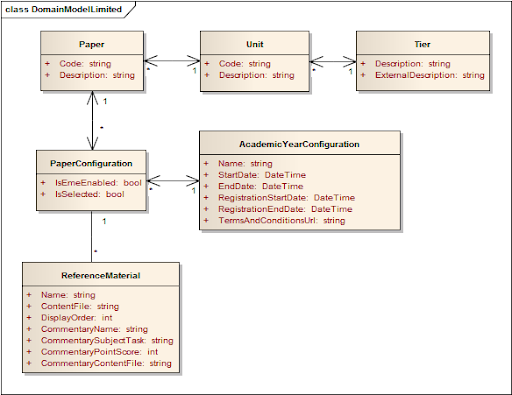使用 NHibernate Criteria API 选择特定的数据集和计数
我为 NHibernate 的持久性设置了以下域: 
我使用 PaperConfiguration 作为根聚合。
我想选择给定 Tier 和 AcademyYearConfiguration 的所有 PaperConfiguration 对象。根据以下示例,这非常有效:(
ICriteria criteria =
session.CreateCriteria<PaperConfiguration>()
.Add(Restrictions.Eq("AcademicYearConfiguration", configuration))
.CreateCriteria("Paper")
.CreateCriteria("Unit")
.CreateCriteria("Tier")
.Add(Restrictions.Eq("Id", tier.Id))
return criteria.List<PaperConfiguration>();
不过也许有更好的方法来做到这一点)。
但还需要知道每个 PaperConfiguration 有多少 ReferenceMaterials,我想在同一个调用中获取它。避免 HQL - 我已经有一个 HQL 解决方案。
我知道这就是预测的目的,这个问题提出了一个想法,但我无法理解让它工作。
我有一个 PaperConfigurationView,而不是 IList ReferenceMaterialCount 并沿着思路思考
ICriteria criteria =
session.CreateCriteria<PaperConfiguration>()
.Add(Restrictions.Eq("AcademicYearConfiguration", configuration))
.CreateCriteria("Paper")
.CreateCriteria("Unit")
.CreateCriteria("Tier")
.Add(Restrictions.Eq("Id", tier.Id))
.SetProjection(
Projections.ProjectionList()
.Add(Projections.Property("IsSelected"), "IsSelected")
.Add(Projections.Property("Paper"), "Paper")
// and so on for all relevant properties
.Add(Projections.Count("ReferenceMaterials"), "ReferenceMaterialCount")
.SetResultTransformer(Transformers.AliasToBean<PaperConfigurationView>());
return criteria.List< PaperConfigurationView >();
不幸的是这不起作用。我做错了什么?
下面的简化查询:
ICriteria criteria =
session.CreateCriteria<PaperConfiguration>()
.CreateCriteria("ReferenceMaterials")
.SetProjection(
Projections.ProjectionList()
.Add(Projections.Property("Id"), "Id")
.Add(Projections.Count("ReferenceMaterials"), "ReferenceMaterialCount")
).SetResultTransformer(Transformers.AliasToBean<PaperConfigurationView>());
return criteria.List< PaperConfigurationView >();
创建了这个相当意外的 SQL:
SELECT
this_.Id as y0_,
count(this_.Id) as y1_
FROM Domain.PaperConfiguration this_
inner join Domain.ReferenceMaterial referencem1_
on this_.Id=referencem1_.PaperConfigurationId
上面的查询失败并出现 ADO.NET 错误,因为它显然不是正确的 SQL,因为它缺少分组依据或计数为 count(referencem1_.Id) 而不是 (this_. ID)。
NHibernate 映射:
<class name="PaperConfiguration" table="PaperConfiguration">
<id name="Id" type="Int32">
<column name="Id" sql-type="int" not-null="true" unique="true" index="PK_PaperConfiguration"/>
<generator class="native" />
</id>
<!-- IPersistent -->
<version name="VersionLock" />
<!-- IAuditable -->
<property name="WhenCreated" type="DateTime" />
<property name="CreatedBy" type="String" length="50" />
<property name="WhenChanged" type="DateTime" />
<property name="ChangedBy" type="String" length="50" />
<property name="IsEmeEnabled" type="boolean" not-null="true" />
<property name="IsSelected" type="boolean" not-null="true" />
<many-to-one name="Paper" column="PaperId" class="Paper" not-null="true" access="field.camelcase"/>
<many-to-one name="AcademicYearConfiguration" column="AcademicYearConfigurationId" class="AcademicYearConfiguration" not-null="true" access="field.camelcase"/>
<bag name="ReferenceMaterials" generic="true" cascade="delete" lazy="true" inverse="true">
<key column="PaperConfigurationId" not-null="true" />
<one-to-many class="ReferenceMaterial" />
</bag>
</class>
<class name="ReferenceMaterial" table="ReferenceMaterial">
<id name="Id" type="Int32">
<column name="Id" sql-type="int" not-null="true" unique="true" index="PK_ReferenceMaterial"/>
<generator class="native" />
</id>
<!-- IPersistent -->
<version name="VersionLock" />
<!-- IAuditable -->
<property name="WhenCreated" type="DateTime" />
<property name="CreatedBy" type="String" length="50" />
<property name="WhenChanged" type="DateTime" />
<property name="ChangedBy" type="String" length="50" />
<property name="Name" type="String" not-null="true" />
<property name="ContentFile" type="String" not-null="false" />
<property name="Position" type="int" not-null="false" />
<property name="CommentaryName" type="String" not-null="false" />
<property name="CommentarySubjectTask" type="String" not-null="false" />
<property name="CommentaryPointScore" type="String" not-null="false" />
<property name="CommentaryContentFile" type="String" not-null="false" />
<many-to-one name="PaperConfiguration" column="PaperConfigurationId" class="PaperConfiguration" not-null="true"/>
</class>
I have the following domain set up for persistence with NHibernate:
I am using the PaperConfiguration as the root aggregate.
I want to select all PaperConfiguration objects for a given Tier and AcademicYearConfiguration. This works really well as per the following example:
ICriteria criteria =
session.CreateCriteria<PaperConfiguration>()
.Add(Restrictions.Eq("AcademicYearConfiguration", configuration))
.CreateCriteria("Paper")
.CreateCriteria("Unit")
.CreateCriteria("Tier")
.Add(Restrictions.Eq("Id", tier.Id))
return criteria.List<PaperConfiguration>();
(Perhaps there is a better way of doing this though).
Yet also need to know how many ReferenceMaterials there are for each PaperConfiguration and I would like to get it in the same call. Avoid HQL - I already have an HQL solution for it.
I know this is what projections are for and this question suggests an idea but I can't get it to work.
I have a PaperConfigurationView that has, instead of IList<ReferenceMaterial> ReferenceMaterials the ReferenceMaterialCount and was thinking along the lines of
ICriteria criteria =
session.CreateCriteria<PaperConfiguration>()
.Add(Restrictions.Eq("AcademicYearConfiguration", configuration))
.CreateCriteria("Paper")
.CreateCriteria("Unit")
.CreateCriteria("Tier")
.Add(Restrictions.Eq("Id", tier.Id))
.SetProjection(
Projections.ProjectionList()
.Add(Projections.Property("IsSelected"), "IsSelected")
.Add(Projections.Property("Paper"), "Paper")
// and so on for all relevant properties
.Add(Projections.Count("ReferenceMaterials"), "ReferenceMaterialCount")
.SetResultTransformer(Transformers.AliasToBean<PaperConfigurationView>());
return criteria.List< PaperConfigurationView >();
unfortunately this does not work. What am I doing wrong?
The following simplified query:
ICriteria criteria =
session.CreateCriteria<PaperConfiguration>()
.CreateCriteria("ReferenceMaterials")
.SetProjection(
Projections.ProjectionList()
.Add(Projections.Property("Id"), "Id")
.Add(Projections.Count("ReferenceMaterials"), "ReferenceMaterialCount")
).SetResultTransformer(Transformers.AliasToBean<PaperConfigurationView>());
return criteria.List< PaperConfigurationView >();
creates this rather unexpected SQL:
SELECT
this_.Id as y0_,
count(this_.Id) as y1_
FROM Domain.PaperConfiguration this_
inner join Domain.ReferenceMaterial referencem1_
on this_.Id=referencem1_.PaperConfigurationId
The above query fails with ADO.NET error as it obviously is not a correct SQL since it is missing a group by or the count being count(referencem1_.Id) rather than (this_.Id).
NHibernate mappings:
<class name="PaperConfiguration" table="PaperConfiguration">
<id name="Id" type="Int32">
<column name="Id" sql-type="int" not-null="true" unique="true" index="PK_PaperConfiguration"/>
<generator class="native" />
</id>
<!-- IPersistent -->
<version name="VersionLock" />
<!-- IAuditable -->
<property name="WhenCreated" type="DateTime" />
<property name="CreatedBy" type="String" length="50" />
<property name="WhenChanged" type="DateTime" />
<property name="ChangedBy" type="String" length="50" />
<property name="IsEmeEnabled" type="boolean" not-null="true" />
<property name="IsSelected" type="boolean" not-null="true" />
<many-to-one name="Paper" column="PaperId" class="Paper" not-null="true" access="field.camelcase"/>
<many-to-one name="AcademicYearConfiguration" column="AcademicYearConfigurationId" class="AcademicYearConfiguration" not-null="true" access="field.camelcase"/>
<bag name="ReferenceMaterials" generic="true" cascade="delete" lazy="true" inverse="true">
<key column="PaperConfigurationId" not-null="true" />
<one-to-many class="ReferenceMaterial" />
</bag>
</class>
<class name="ReferenceMaterial" table="ReferenceMaterial">
<id name="Id" type="Int32">
<column name="Id" sql-type="int" not-null="true" unique="true" index="PK_ReferenceMaterial"/>
<generator class="native" />
</id>
<!-- IPersistent -->
<version name="VersionLock" />
<!-- IAuditable -->
<property name="WhenCreated" type="DateTime" />
<property name="CreatedBy" type="String" length="50" />
<property name="WhenChanged" type="DateTime" />
<property name="ChangedBy" type="String" length="50" />
<property name="Name" type="String" not-null="true" />
<property name="ContentFile" type="String" not-null="false" />
<property name="Position" type="int" not-null="false" />
<property name="CommentaryName" type="String" not-null="false" />
<property name="CommentarySubjectTask" type="String" not-null="false" />
<property name="CommentaryPointScore" type="String" not-null="false" />
<property name="CommentaryContentFile" type="String" not-null="false" />
<many-to-one name="PaperConfiguration" column="PaperConfigurationId" class="PaperConfiguration" not-null="true"/>
</class>
如果你对这篇内容有疑问,欢迎到本站社区发帖提问 参与讨论,获取更多帮助,或者扫码二维码加入 Web 技术交流群。

绑定邮箱获取回复消息
由于您还没有绑定你的真实邮箱,如果其他用户或者作者回复了您的评论,将不能在第一时间通知您!


发布评论
评论(1)
您应该使用 Projections.GroupProperty() 而不是 Projections.Property()。
You should use Projections.GroupProperty() instead of Projections.Property().